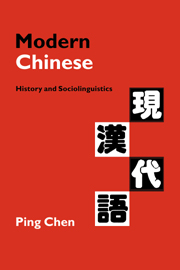Book contents
- Frontmatter
- Contents
- List of tables
- Preface
- Acknowledgements
- List of abbreviations
- 1 Introduction
- Part I Modern Spoken Chinese
- 2 Establishment and promotion of Modern Spoken Chinese
- 3 Norms and variations of Modern Standard Chinese
- 4 The standard and dialects
- Part II Modern Written Chinese
- Part III The modern Chinese writing system
- Notes
- References
- Index
4 - The standard and dialects
Published online by Cambridge University Press: 05 June 2012
- Frontmatter
- Contents
- List of tables
- Preface
- Acknowledgements
- List of abbreviations
- 1 Introduction
- Part I Modern Spoken Chinese
- 2 Establishment and promotion of Modern Spoken Chinese
- 3 Norms and variations of Modern Standard Chinese
- 4 The standard and dialects
- Part II Modern Written Chinese
- Part III The modern Chinese writing system
- Notes
- References
- Index
Summary
Dialects in contact
Dialects are first and foremost geographical variants of language. Broadly speaking, when speakers of a dialect come into close contact with speakers of another dialect, three situations may eventuate with regard to the dialects involved, namely replacement, merging, or coexistence.
Replacement occurs where one of the dialects in contact is much stronger than the others in terms of number of speakers and/or prestige, gradually relegating the latter to disuse and oblivion. As a result, the geographical area in which the strong dialect is spoken expands while that of the weak one shrinks. Dialects in contact may merge, resulting in a new dialect that more or less combines the features from all the contributing dialects. Lastly, both the indigenous and the introduced dialect may remain more or less intact, with most local residents becoming bilingual either in the dialects in contact, or in their native tongue and a third dialect that has been chosen as the lingua franca of the community.
As observed by Ferguson (1959) and Fishman (1967), very often diglossia develops in a bilingual community. Diglossia, as defined by Ferguson (1959), refers to the situation in which a language has two grammatically and lexically distinct varieties, one of high status and one of low status, which are stable in a community. The former is called the High variety, and the latter the Low variety. Each of them is associated with a distinct set of functions, attitudes, and values.
- Type
- Chapter
- Information
- Modern ChineseHistory and Sociolinguistics, pp. 50 - 64Publisher: Cambridge University PressPrint publication year: 1999



